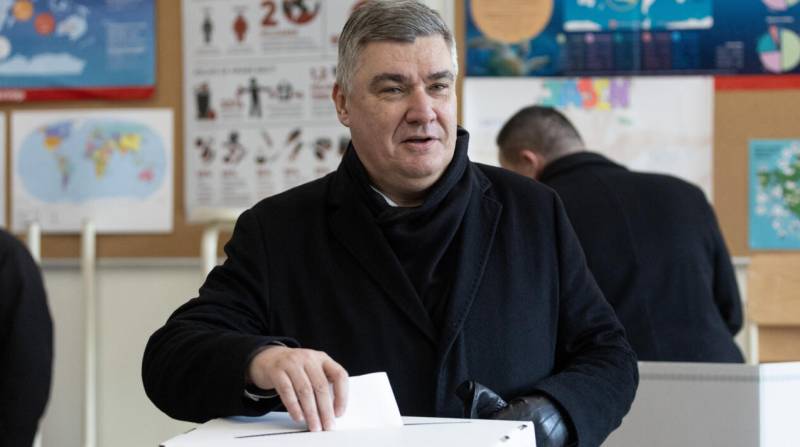Croatia's populist president appears set for re-election

Stay tuned with 24 News HD Android App

Croatians were casting ballots Sunday in a presidential runoff where the populist incumbent Zoran Milanovic appears set to win a second term, in what would be a blow to the scandal-hit governing party.
Milanovic entered the contest with surging momentum against Dragan Primorac, who is supported by the centre-right HDZ party that governs Croatia.
While the role of the president is largely ceremonial in Croatia, a landslide win by Milanovic would be the latest setbacks for the HDZ and Prime Minister Andrej Plenkovic -- Milanovic's political arch-rival -- after a high-profile corruption scandal in November.
The outspoken presidential incumbent, backed by the left-wing opposition, won more than 49 percent of the vote in the contest's first round two weeks ago -- narrowly missing an outright victory.
Primorac garnered less than 20 percent of the ballots, making it unlikely that he will make up ground in the runoff.
The vote comes as the European Union member nation of 3.8 million people struggles with the highest inflation rate in the eurozone, endemic corruption and a labour shortage.
At 1530 GMT, or two and a half hours before voting was to end, turnout was nearly 35 percent, the electoral commission said -- slightly lower than at that time in the first round.
'Counterbalance'
Even with its limited roles, many Croatians see the presidency as key to providing a political balance by preventing one party from holding all the levers of power.
The former Yugoslav republic has been mainly governed by the HDZ since declaring independence in 1991.
The party "has too much control and Plenkovic is transforming into an autocrat," Mia, a 35-year-old administrator from Zagreb who declined to give her last name, told AFP explaining her support for the incumbent.
Milanovic, a former left-wing prime minister, won the presidency in 2020 with the backing of the main opposition Social Democrats (SDP) party.
A key figure in the country's political scene for nearly two decades, he has increasingly employed offensive, populist rhetoric during frequent attacks aimed at EU and local officials.
"Milanovic is a sort of a political omnivore," political analyst Zarko Puhovski told AFP, saying the president was largely seen as the "only, at least symbolic, counterbalance to the government and Plenkovic's power".
His no-holds-barred speaking style has sent Milanovic's popularity soaring and helped attract the backing of right-wing supporters.
On Sunday, after voting in Zagreb and voicing confidence in victory, Milanovic criticised Brussels as "in many ways autocratic and non-representative", run by officials who are not elected.
The 58-year-old also regularly pans the HDZ over the party's perennial problems with corruption, while also referring to Plenkovic as "Brussels' clerk".
'Russian player'
Primorac, a former education and science minister returning to politics after a 15-year absence, has campaigned as a unifier for Croatia. The 59-year-old also insisted on patriotism and family values.
"My message is always the same -- Croatia always comes first for me," he told journalists after voting in Zagreb, adding that he would now attend a mass.
One voter, 62-year-old pensioner Djuro Knezicic, said he backed Primorac as a person with "good international ties and he would achieve much better international cooperation for Croatia".
But critics say Primorac lacks political charisma and has failed to rally the HDZ base behind him.
He accuses Milanovic of being a "pro-Russian puppet" who has undermined Croatia's credibility in NATO and the European Union.
Milanovic condemned Russia's invasion of Ukraine but has also criticized the West's military support for Kyiv.
He is also a prominent opponent of a program that would have seen Croatian soldiers help train Ukrainian troops in Germany.
"The defense of democracy is not to tell everyone who doesn't think like you that he's a 'Russian player'," Milanovic told reporters on Sunday.
Such a communication style is "in fact totalitarian", he added.
Meanwhile, young Croatians voiced frustration over the lack of discussion among political leaders over the issues that interest them, such as housing or students' standard of living.
"We hear them (politicians) talking mostly about old, recycled issues. What's important to young people doesn't even cross their minds," student Ivana Vuckovic, 20, told AFP.
